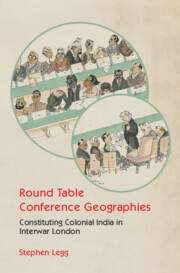Book contents
- Frontmatter
- Contents
- List of Figures and Tables
- Acknowledgements
- Note on Conversions, Spellings and Abbreviations
- 1 Introduction: Squaring Round Tables
- Part I Geographical Imaginations
- Part II Conference Infrastructures
- Part III The Conference City
- Part IV Representations
- Notes
- References
- Index
- Miscellaneous Endmatter
7 - A Hospitable State? Official Socialising
Published online by Cambridge University Press: 15 January 2023
- Frontmatter
- Contents
- List of Figures and Tables
- Acknowledgements
- Note on Conversions, Spellings and Abbreviations
- 1 Introduction: Squaring Round Tables
- Part I Geographical Imaginations
- Part II Conference Infrastructures
- Part III The Conference City
- Part IV Representations
- Notes
- References
- Index
- Miscellaneous Endmatter
Summary
AN INHOSPITABLE CITY?
The breakout story of the first conference session was the acceptance of the principle of all-India federation by the princes. This had taken many by surprise, including the viceroy, who had been assured by the princes before they left for London that they opposed immediate moves towards federation. On 23 November, however, he wrote to his father of his surprise that the princes had become ‘the most earnest champions of speedy action in this direction’. He could only speculate that the princes were acting ‘apparently under some influence that is still rather obscure to me’. Similarly, in an undated note from the undersecretary of state for India’s files reflecting on the princes’ activities after arriving in London, it was suggested that their opinions were ‘in a process of evolution as a result of contact with one another, and with the British Indian delegates, and it would be a rush to prophecy how they may develop by the time the conference meets’.
On 14 November 1930, two days after the conference opened, Hailey had written to Irwin suggesting that the princes had ‘yielded to the general afflatus which prevails in London, owing to the deliberations of the Imperial Conference, followed by those of the Indian Conference, and have determined to take a much more definite hand in the proceedings than we could have expected’. For Hailey, London had an ‘afflatus’, some communication of almost divine knowledge or poetic inspiration. But where did it come from? In later discussions between Irwin, Round Table Conference (RTC) delegates and Gandhi in New Delhi, the latter gave his backing to the idea of a conference session in the Indian capital. Speaking on 21 March 1931, he suggested that ‘by its sittings the Conference will both affect its surrounding atmosphere and be affected by it’.
This RTC afflatus, or atmosphere, had many components (Legg 2020b). It was constituted by the sense of a free conference, by the dozens of expert delegates and staff who made the conference work and by the splendour and efficiency of St James’s Palace. But it was also, to a large degree, a product of the conference taking place in the imperial and national capital.
- Type
- Chapter
- Information
- Round Table Conference GeographiesConstituting Colonial India in Interwar London, pp. 193 - 220Publisher: Cambridge University PressPrint publication year: 2023



